Animal Behaviorist Gets Mad At Her Senior Neighbors For Locking Up Her Dog In Their Home
Have you ever come home from a long day at work, only to find that your dog has taken off? And by "taken off," we mean they've actually run away from home.
It's enough to make any pet owner frustrated, and it's a question that many of us have wondered about: "Why do some dogs love to run away from their homes?"
Is it boredom? A lack of attention?
While there are a number of possible explanations for this behavior, the most likely reason is that the dog is simply following its natural instincts. After all, dogs are descendants of wolves, which are natural-born hunters.
When a wolf catches its prey, it typically drags it back to its den in order to feast on it in peace. In contrast, domestic dogs have little need to hunt for their food since they are typically fed by their owners.
However, the instinct to drag their prey back to their dens remains. As a result, some dogs may view running away from home as an opportunity to fulfill this instinctive urge.
While this behavior may be perplexing to dog owners, it is simply a reflection of the dog's natural heritage. That's why it's always the responsibility of an owner to find ways to keep their dogs inside their homes and to entertain the doggos even without their presence.
Recently, an animal behaviorist vented her problem on the "Am I The A**hole?" (AITA) subreddit. She is very upset with her neighbors because whenever her dog escapes from her home, it goes to her neighbors' house.
To make matters worse, these neighbors are locking up their home, preventing the dog from coming back. Let's see how Redditors judged the situation.
The original poster (OP) admits that she is annoyed at her neighbors.
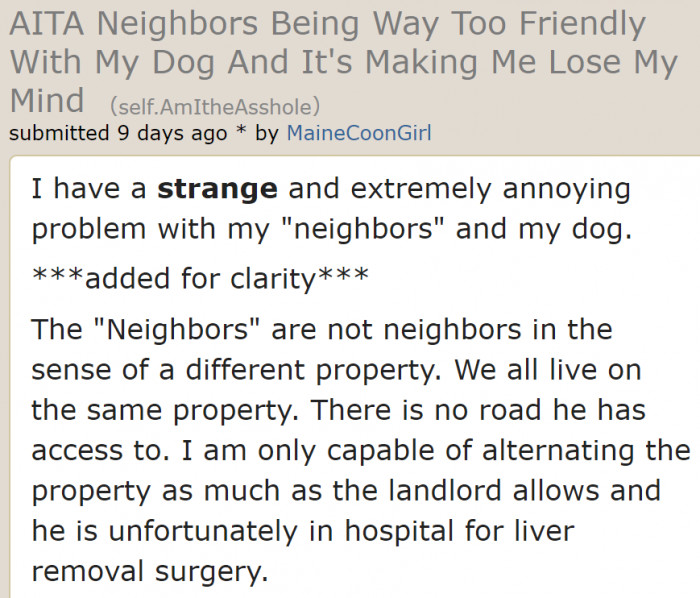
The OP is an animal behaviorist who owns a dog that tends to run away from home.
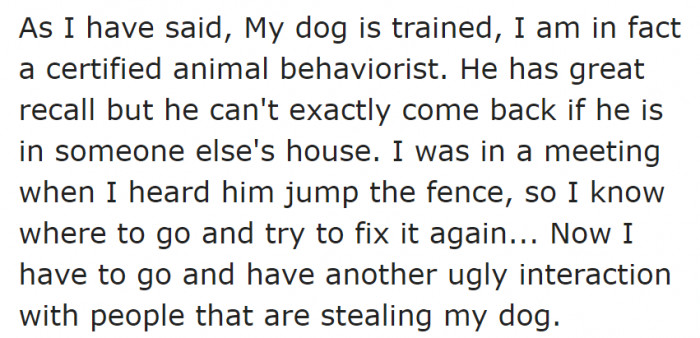
These neighbors are being overly friendly with her dog.

Dogs often exhibit escape behaviors due to instinctual drives, including curiosity and the desire for social interaction. According to research published in the Journal of Veterinary Behavior, many dogs are motivated to explore their environment, especially if they are bored or under-stimulated at home.
This exploration can lead them to neighboring homes, where they may find social engagement or new scents that pique their interest.
Creating a Secure Environment
Creating a secure environment is essential in preventing a dog from escaping. Pet owners should assess their homes for potential escape routes, such as open gates or weak fences. A study published in the Journal of Animal Behavior indicates that dogs feel more secure in environments where they cannot easily escape.
Investing in proper fencing and secure enclosures can significantly reduce escape attempts.
Understanding Aggression in Dogs
Aggressive behavior in dogs can stem from various factors, including fear, territoriality, and lack of socialization.
Veterinary behaviorists emphasize that understanding the root cause of aggression is essential for effective management.
Behavioral interventions can help both the dog and owner navigate these challenges more successfully.
She explains the situation that's driving her insane.
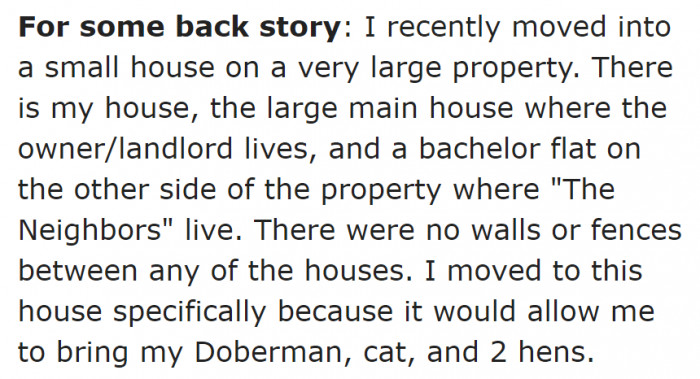
The neighbors are spoiling the dog, so its routine and behavior have gone haywire.
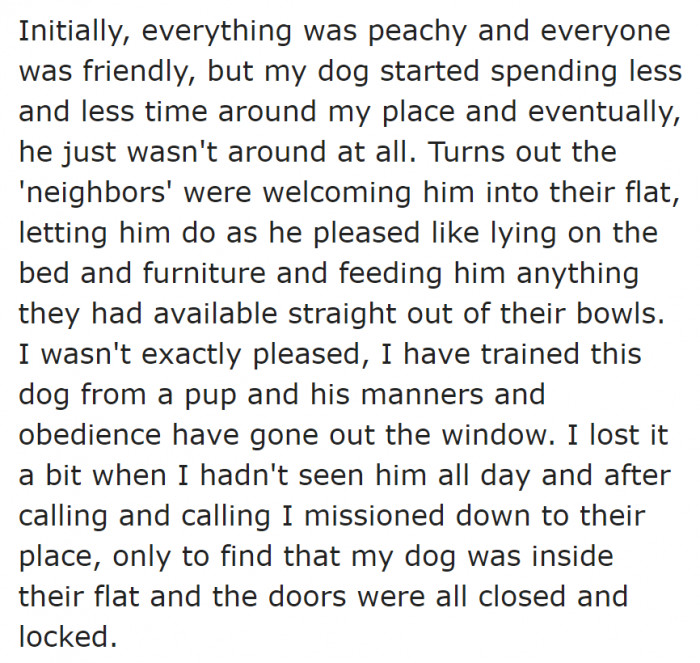
The landlord tried to help by putting up a fence around the OP's home.
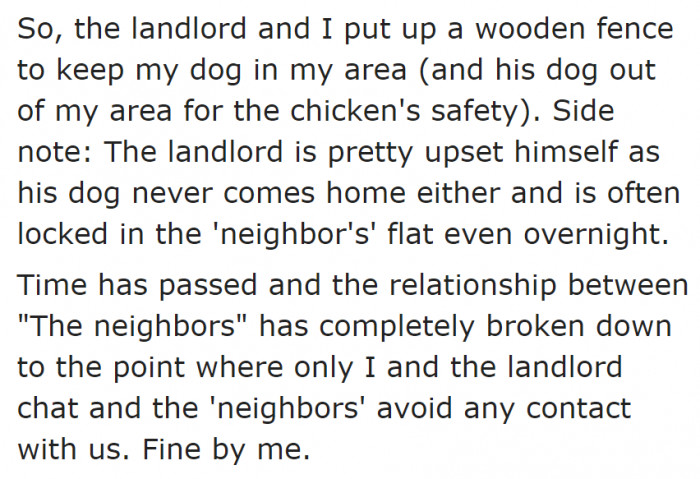
Understanding Canine Behavior
Behavioral experts suggest that dogs are social animals who thrive on interaction and stimulation. A study from the American Psychological Association highlights that dogs left alone for extended periods may experience loneliness, prompting them to seek companionship elsewhere.
This need for socialization is crucial; dogs that lack interaction may develop anxiety or destructive behaviors.
The relationship between neighbors often becomes strained when one party feels their space is invaded by another's pets.
Psychologists note that feelings of intrusion can lead to heightened tensions and misunderstandings.
Recognizing these feelings can be the first step toward addressing the issue constructively and compassionately.
These neighbors have spoiled the dog too much. That's why it's always looking for ways to get out.
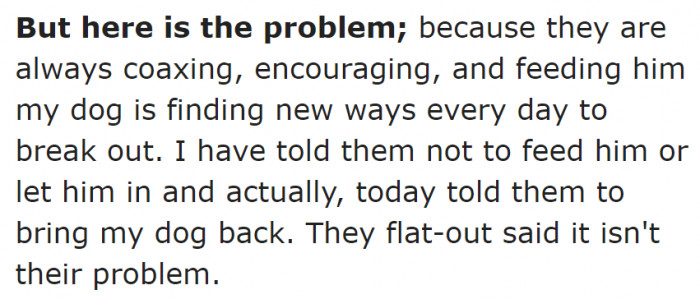
She doesn't want to lock up the dog.

The OP is just looking for people who will agree with her.
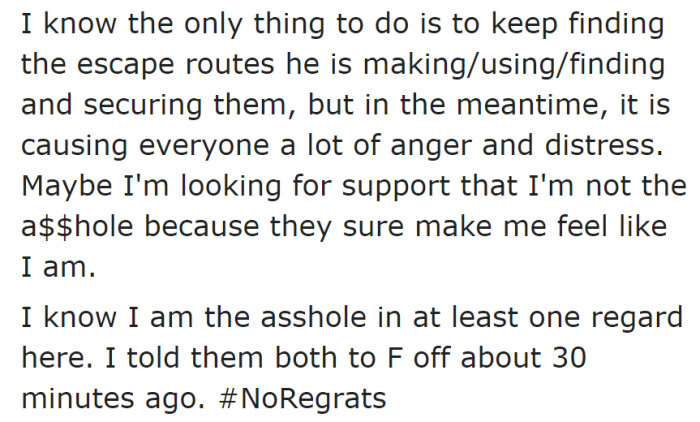
Environmental factors significantly influence a dog's behavior. A comprehensive study found that dogs in stimulating environments were less likely to engage in escape behaviors. The research indicates the importance of providing mental and physical activities.
Activities like puzzle toys and regular walks can help alleviate boredom and reduce the likelihood of escape attempts.
Expert Advice on Managing Aggressive Dog Behavior
Experts recommend proactive measures, such as socialization classes and training, to address aggressive tendencies in dogs.
Providing structured environments for dogs to interact positively with others can significantly reduce aggressive behaviors.
Furthermore, consulting a professional trainer can provide tailored strategies for specific behavioral issues.
The community's reaction is mixed. This Redditor, for instance, believes that everyone sucks.
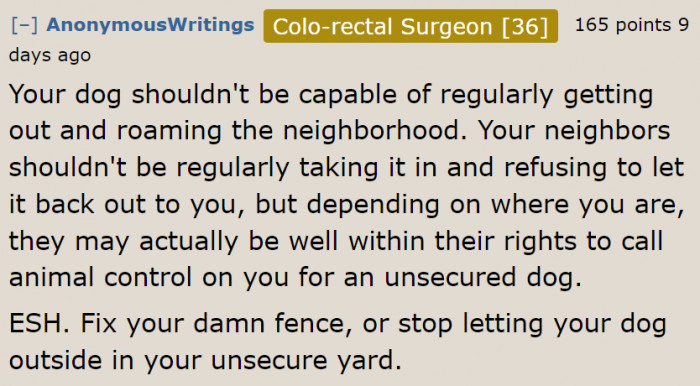
The OP's efforts aren't enough according to this user.
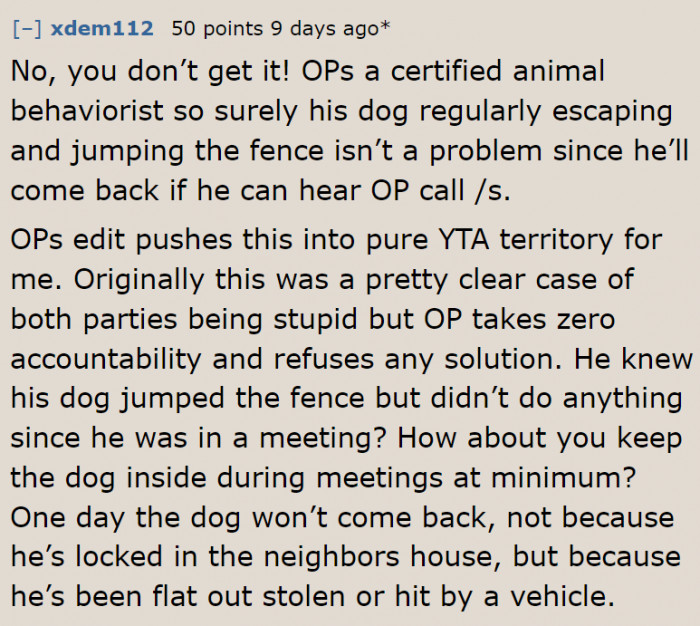
And then there are users who believe she isn't in the wrong.
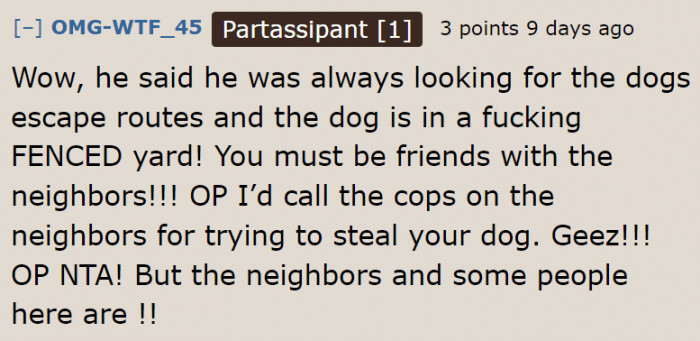
Practical Solutions for Pet Owners
To help curb a dog's tendency to escape, experts recommend increasing daily exercise and mental stimulation. A study at the University of Pennsylvania found that dogs receiving adequate physical activity were less likely to run away.
Implementing a structured routine that includes walks, playtime, and training sessions can create a more predictable and enriching environment for dogs.
Understanding the dynamics of interspecies relationships sheds light on human-animal interaction challenges.
Research shows that positive reinforcement and consistent training can foster better communication between dogs and their owners.
This dynamic emphasizes the importance of establishing trust and security, which can help mitigate aggressive responses.
These users are criticizing the OP for being lazy in coming up with solutions.
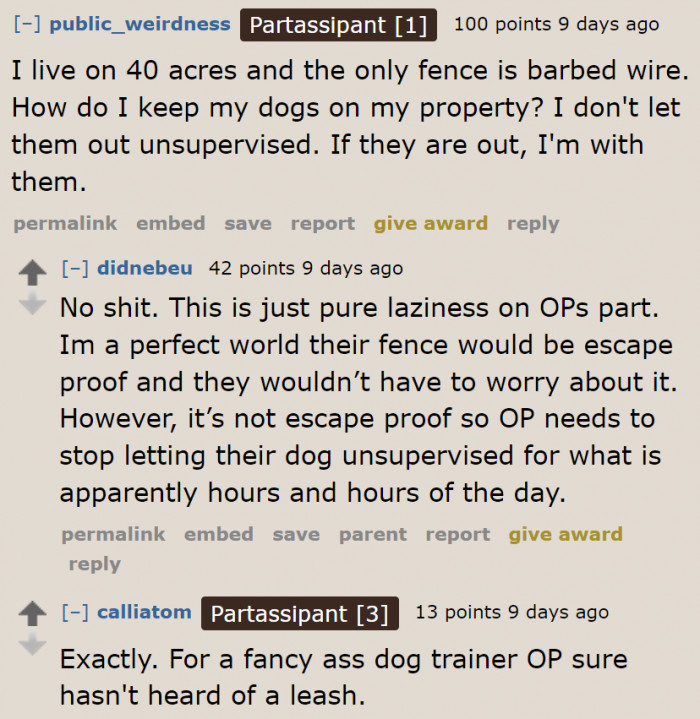
Others believe she's irresponsible.

The neighbors need to stop spoiling the dog, and the OP needs to start supervising her dog.
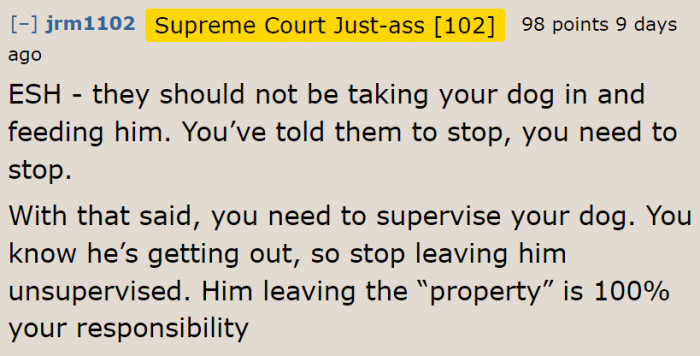
A dog's behavior can also be shaped by previous experiences. Research indicates that dogs with a history of neglect or abandonment may be more prone to escape behaviors due to anxiety.
Understanding these underlying causes is essential for pet owners. Behavioral modification strategies, such as positive reinforcement training, can help build a dog's confidence and reduce anxiety-related escape attempts.
The OP needs to put in more effort to regain control over her dog.
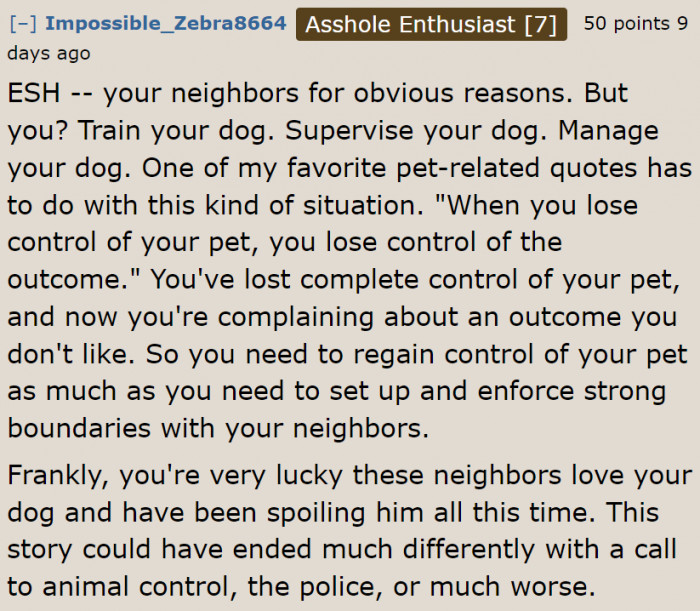
She needs to stop making excuses too.
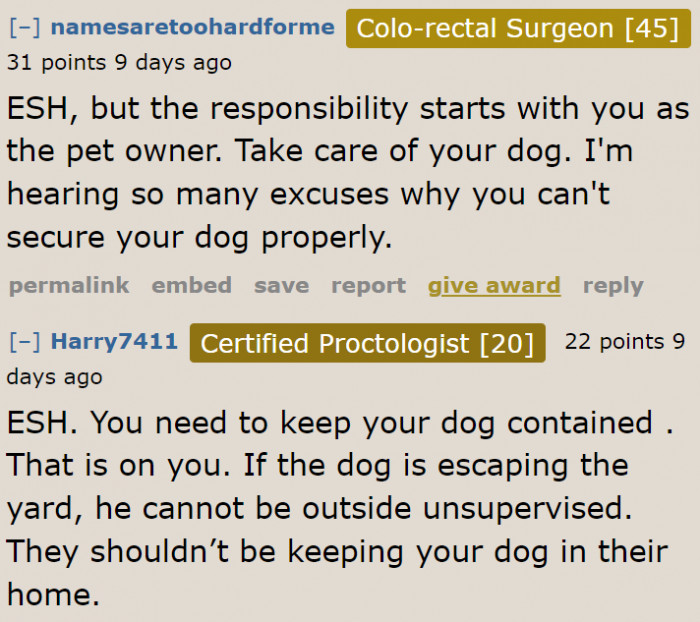
Maybe it's time the OP takes this experience as a lesson.
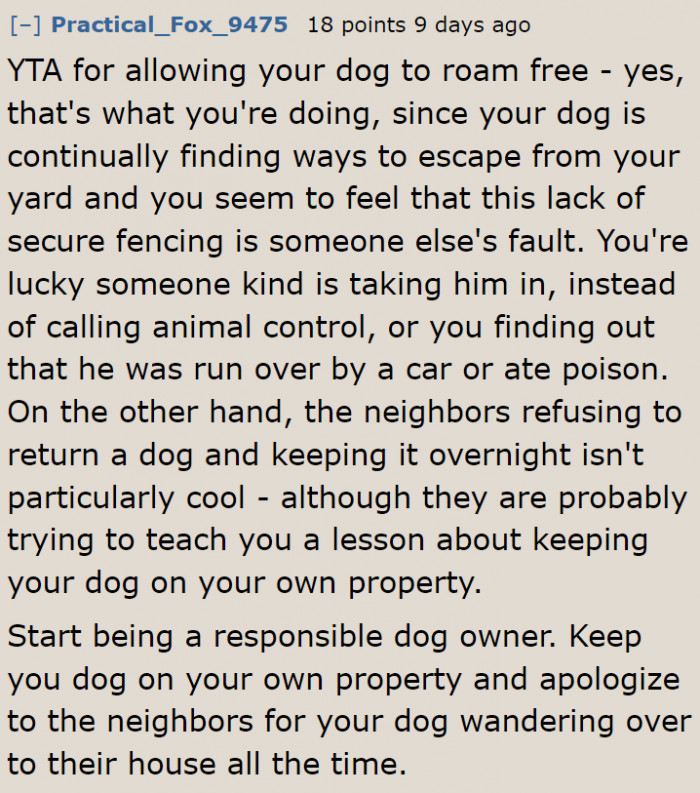
The Role of Socialization
Socialization plays a crucial role in a dog's overall behavior. According to developmental psychology research, early exposure to various environments and experiences can foster adaptability and reduce anxiety.
Veterinary behaviorists recommend gradual introductions to new experiences and environments to support a dog's development and reduce the urge to escape.
Supervision is key.
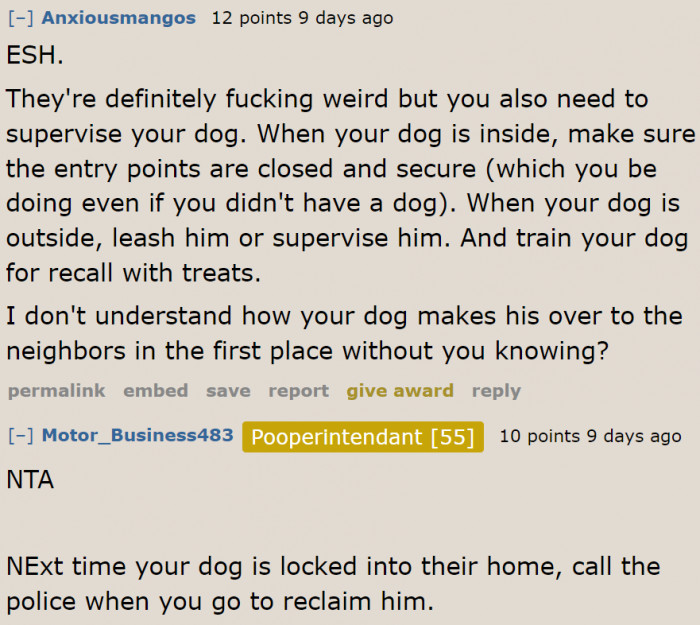
A user believes the neighbors are stealing the dog.
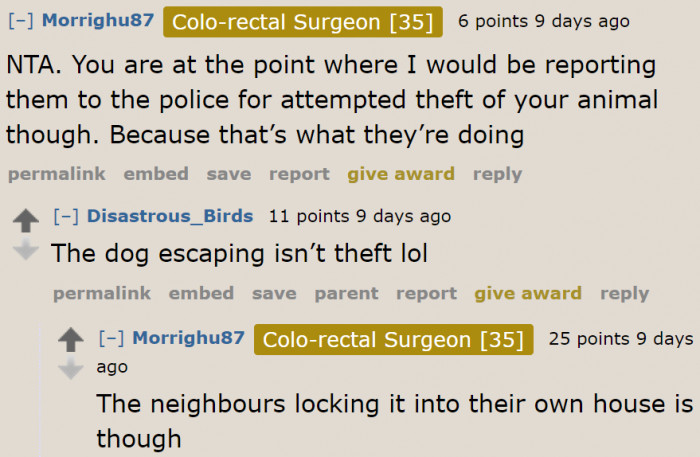
She isn't responsible enough according to these users. That's why this happened.
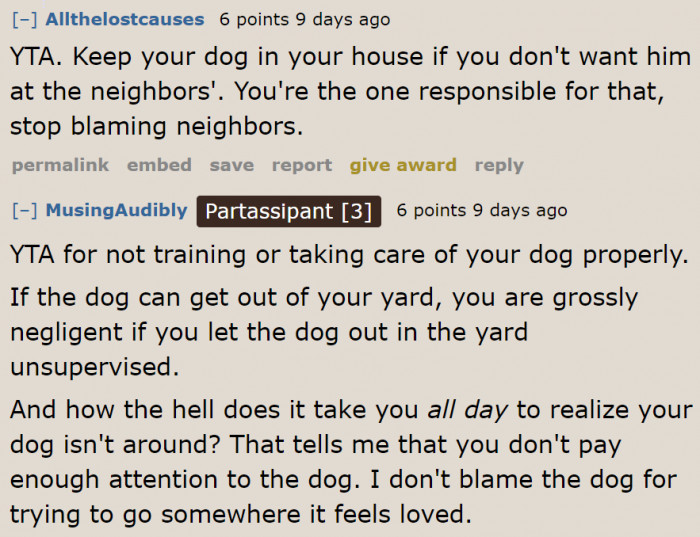
Veterinary behaviorists emphasize the importance of understanding canine body language to prevent escape incidents. Recognizing signs of stress or anxiety can allow pet owners to intervene early.
Research from the University of California highlights that dogs may exhibit anxiety signals before attempting to escape, such as pacing or excessive barking. Ensuring a calm, safe environment can mitigate these behaviors.
Well, this was an interesting story. In the end, most people didn't like the lack of effort from the OP.
At the same time, they also agree that the neighbors shouldn't be feeding the dog and locking it up in their home. We hope the OP finds a way to keep the dog inside and retrain it to maintain an ideal routine.
Psychological Analysis
This situation highlights the complexities of dog ownership, especially when aggression is involved.
It underscores the importance of proactive management strategies to ensure the safety of both pets and people while maintaining community harmony.
Analysis generated by AI
Analysis & Alternative Approaches
In conclusion, managing dog behavior requires understanding the underlying psychological factors that drive aggression.
By implementing appropriate training and fostering open communication with neighbors, owners can create a more harmonious living environment.
Ultimately, prioritizing both canine welfare and neighborly relationships is essential for peaceful coexistence.



